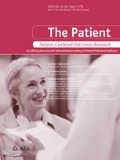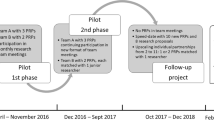Abstract
Background
Patients are incidentally involved in scientific conferences as collaborating partners. Little is known about how they engage with researchers.
Objective
The purpose of this study was to explore the expectations and experiences of new patients to better understand the specific features of collaborative research during conferences in its complexity.
Study Design
After a thematic literature review, we conducted fourteen interviews with eight delegates: four men and four women with three rheumatic diseases and representing five countries. They participated for the first time in the biannual conference on Outcome Measures in Rheumatology (OMERACT) in 2010. Data were subjected to a thematic content analysis.
Results
Before the conference, patient participants had felt privileged to be invited but felt insufficiently prepared and uncertain about what was expected from their participation. They had anticipated a learning experience and had hoped to be able to make a contribution. Most experienced the conference program as physically and mentally challenging, partially due to poor moderation or lack of individual support. They doubted their input had been beneficial. After the conference these patients also described their participation as having been a valuable, meaningful, and learning experience. Although they presumed that they had not been very productive, they expected their contribution would be more effective at future conferences.
Conclusions
Patient delegates attending a scientific conference need clear information about their role prior to the event. Personalized support and a facilitative moderation style during sessions are advantageous for maximizing valuable contributions. Participation leads to personal learning curves and various benefits.
Similar content being viewed by others
References
Kirwan J, Heiberg T, Hewlett S, Hughes R, Kvien T, Ahlmen M, et al. Outcomes from the patient perspective workshop at OMERACT 6. J Rheumatol (Consensus Development Conference Review). 2003;30(4):868–72.
Kirwan JR, Ahlmen M, de Wit M, Heiberg T, Hehir M, Hewlett S, et al. Progress since OMERACT 6 on including patient perspective in rheumatoid arthritis outcome assessment. J Rheumatol. 2005;32(11):2246–9.
Kirwan JR, Hewlett SE, Heiberg T, Hughes RA, Carr M, Hehir M, et al. Incorporating the patient perspective into outcome assessment in rheumatoid arthritis—progress at OMERACT 7. J Rheumatol. 2005;32(11):2250–6.
Kirwan JR, Newman S, Tugwell PS, Wells GA, Hewlett S, Idzera L, et al. Progress on incorporating the patient perspective in outcome assessment in rheumatology and the emergence of life impact measures at OMERACT 9. J Rheumatol. 2009;36(9):2071–6.
de Wit MPT, Abma TA, Koelewijn-van Loon MS, Collins S, Kirwan JR. Involving patient research partners has a significant impact on outcomes research: a responsive evaluation of the international OMERACT conferences. BMJ Open. 2013 (accepted).
Hewlett S, De Wit M, Richards P, Quest E, Hughes R, Heiberg T, et al. Patients and professionals as research partners: challenges, practicalities, and benefits. Arthritis Rheum. 2006;55(4):676–80.
Elberse JE, Caron-Flinterman JF, Broerse JE. Patient–expert partnerships in research: how to stimulate inclusion of patient perspectives. Health Expect. 2011;14:225–39.
van de Bovenkamp HM. The limits of patient power. Examining active citizenship in Dutch health care. Dissertation. Rotterdam: Erasmus University; 2010.
Caron-Flinterman JF, Broerse JE, Bunders JF. The experiential knowledge of patients: a new resource for biomedical research? Soci Sci Med. 2005;60(11):2575–84.
Schipper K. Patient participation and knowledge [thesis]. Amsterdam: VU University; 2011.
Wells G, Anderson J, Beaton D, Bellamy N, Boers M, Bombardier C, et al. Minimal clinically important difference module: summary, recommendations, and research agenda. J Rheumatol (Consensus Development Conference Review). 2001;28(2):452–4.
Tugwell P, Boers M, Brooks P, Simon L, Strand V, Idzerda L. OMERACT: an international initiative to improve outcome measurement in rheumatology. Trials. 2007;8:38.
OMERACT. Policy on including the patient perspective in rheumatology outcomes assessment. Plus OMERACT executive comments—appendix 32006 (unpublished). Draft 2 as at 2 February 2006.
Kirwan JR, Newman S, Tugwell PS, Wells GA. Patient perspective on outcomes in rheumatology—a position paper for OMERACT 9. J Rheumatol. 2009;36(9):2067–70.
Quest E, Aanerud GJ, Kaarud S, Collins S, Leong A, Smedeby B, et al. Patients’ perspective. J Rheumatol. 2003;30(4):884–5.
Stake RE. Standards-based and responsive evaluations. Thousand Oaks: Sage Publications; 2004.
Guba EG, Lincoln YS. Fourth generation evaluation. Beverly Hills: SAGE Publications; 1989.
Britten N. Qualitative interviews in medical research. BMJ. 1995;311(6999):251–3.
Hsieh HF, Shannon SE. Three approaches to qualitative content analysis. Qual Health Res. 2005;15(9):1277–88.
de Wit MPT, Berlo SE, Aanerud GJ, Aletaha D, Bijlsma JW, Croucher L, et al. European League Against Rheumatism recommendations for the inclusion of patient representatives in scientific projects. Ann Rheum Dis (Consensus Development Conference Research Support, Non-U.S. Gov’t). 2011;70(5):722–6.
Barber R, Boote J, Parry G, Cooper C, Yeeles P. Evaluating the impact of public involvement on research. In: Cotterell P, Barnes M, editors. Critical perspectives on user involvement. Bristol: The Policy Press, University of Bristol; 2012. p. 217–23.
Barbour RS. Checklists for improving rigour in qualitative research: a case of the tail wagging the dog? BMJ. 2001;322(7294):1115–7.
Kuper A, Lingard L, Levinson W. Critically appraising qualitative research. BMJ. 2008;337:a1035.
van Nes F, Abma T, Jonsson H, Deeg D. Language differences in qualitative research: is meaning lost in translation? Eur J Ageing. 2010;7(4):313–6.
Richards P, de Wit MPT. OMERACT glossary; 2010. http://reuma.rediris.es/omeract/docs/OMERACT-Glossary.htm.
Staniszewska S, Haywood KL, Brett J, Tutton L. Patient and public involvement in patient-reported outcome measures: evolution not revolution. Patient. 2012;5(2):79–87.
McKie L. Rhetorical spaces: participation and pragmatism in the evaluation of community health work. Evaluation. 2003;9(3):307–24.
Wittenbaum GM, Moreland RL. Small-group research in social psychology: topics and trends over time. Soc Pers Psychol Compass. 2008;2(1):187–203.
Tuckman BW, Jensen MAC. Stages of small group development revisited. Group Org Stud. 1977;2:419–27.
Baur VE, van Elteren AHG, Nierse CJ, Abma TA. Dealing with distrust and power dynamics: asymmetric relations among stakeholders in responsive evaluation. Evaluation. 2010;16(3):233–48.
OMERACT. Guiding principles for patient research partner participation in OMERACT; 2011 [updated V1.0, 27 March 2011; cited 2012 October 18]. http://www.omeract.org/pdf/2011-03-27%20Agreed%20Patient%20Participation%20Policy.pdf.
Abma TA, Nierse C, Widdershoven G. Patients as partners in responsive research: methodological notions for collaborations in mixed research teams. Qual Health Res. 2009;19(3):401–15.
Nierse CJ, Abma TA. Developing voice and empowerment: the first step towards a broad consultation in research agenda setting. J Intellect Disabil Res. 2011;55(4):411–21.
Nierse CJ, Schipper K, van Zadelhoff E, van de Griendt J, Abma TA. Collaboration and co-ownership in research: dynamics and dialogues between patient research partners and professional researchers in a research team. Health Expect. 2012;15:242–54.
Abma TA. Patients as partners in a health research agenda setting: the feasibility of a participatory methodology. Eval Health Prof (Research Support, Non-U.S. Gov’t). 2006;29(4):424–39.
Gergen KJ. Action research and orders of democracy. Action Res. 2003;1(1):39–56.
Acknowledgments
The authors thank the eight patient research partners for their unconditional support and open participation during the conference and thereafter.
No sources of funding were received to conduct this study. MW received a EULAR/OMERACT bursary to attend OMERACT 10. MW, MK, SC, TA, and JK declared having no conflicts of interest.
MW, TA, and JK invented the design of the study; MW performed the interviews and drafted the initial manuscript; MW and MK independently coded the interview transcripts. All authors were involved in the analysis of the data and reviewed and commented on the article.
Author information
Authors and Affiliations
Corresponding author
Rights and permissions
About this article
Cite this article
de Wit, M.P.T., Koelewijn-van Loon, M.S., Collins, S. et al. “If I Wasn’t This Robust”: Patients’ Expectations and Experiences at the Outcome Measures in Rheumatology Conference 2010. Patient 6, 179–187 (2013). https://doi.org/10.1007/s40271-013-0017-0
Published:
Issue Date:
DOI: https://doi.org/10.1007/s40271-013-0017-0




